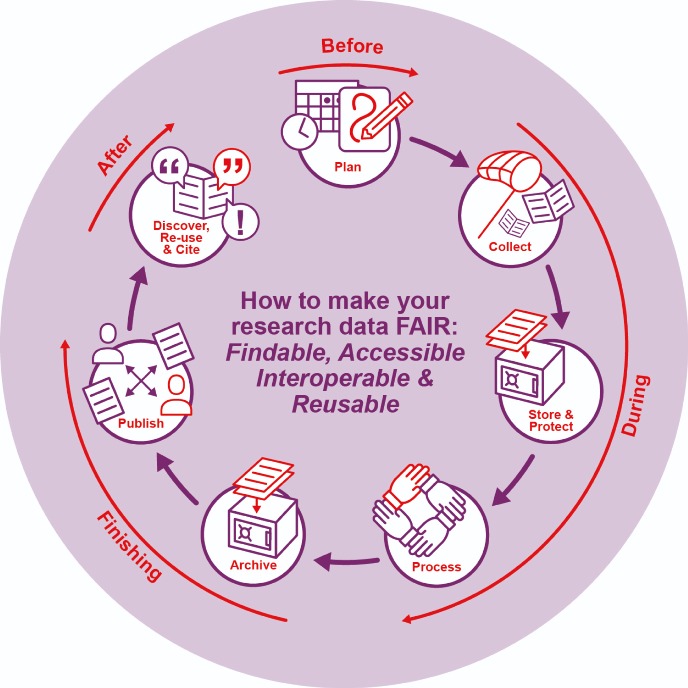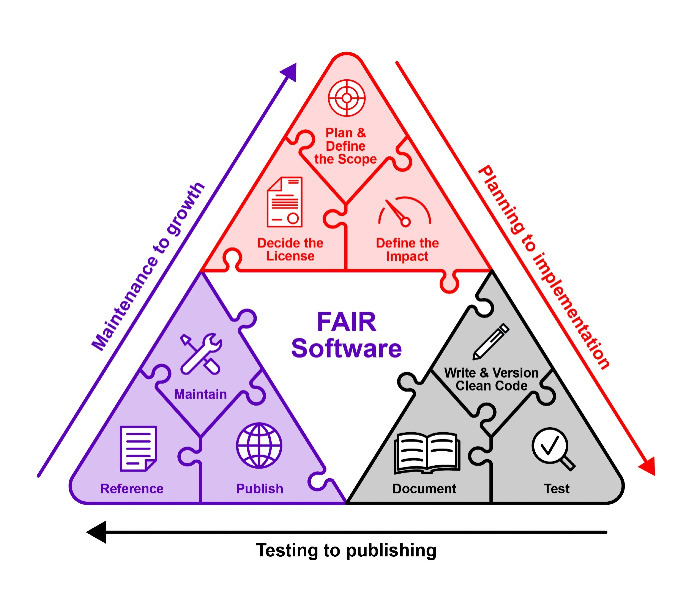Celebrating 10 years of empowering research: a decade of data management services at the UG

For the past decade, the University of Groningen (UG) has been on a journey to shape the ever-evolving landscape of academic research by developing data management services. From the nascent stages of the Research Data Office (RDO) to its evolution into the Digital Competence Centre (DCC), these services have become a pillar in the research ecosystem of the university, enabling scholarly pursuits while navigating the complexities of data in the digital age.
Research data have enormous potential for new inventions, perspectives, and innovative solutions. The condition is that this data is made Findable, Accessible, Interoperable and Reusable (FAIR). Responsible data management is key to achieving that. We interviewed several UG professionals who were involved in the development of data management services at the UG to guide us through its decade-long history.
A step into the unknown
The journey started at the end of 2013, when the University of Groningen began contemplating the regulation of storage and management of research data, motivated by the recommendation from KNAW’s Schuyt committee on ‘Responsible research data management and the prevention of scientific misconduct’. Recognizing the significance of managing research data was catalyzed by pivotal moments such as the Diederik Stapel case - social psychologist who fabricated his data - and the growing global emphasis on research integrity and reproducibility.
"The Netherlands was in a similar stage, it was a pioneering phase for everybody."
This concluded into a three-tier approach: faculties were asked to create policies on how researchers could adapt and implement best practices, the legal department sorted out data regulations, and a support desk was created. The latest approach resulted in the launch in 2014 of the first research data management service at the UG: The Research Data Office (RDO), a support service of the University Library (UB) and the Center for Information Technology (CIT).
Pioneering research data management services
Drs. Christina Elsenga, Research Data Management consultant at the UG Digital Competence Centre (DCC), reflected on the humble beginnings: "It was difficult to get the Research Data Office from the ground. We had to tackle questions on how to build this new service and technical challenges in data management. The Netherlands was in a similar stage; it was a pioneering phase for everybody." Early RDO initiatives aimed at enhancing data management practices, promoting the creation of data management plans, and raising awareness among researchers about transparent data practices.
The University Medical Center Groningen (UMCG) was collaborating with the UG from the early stages to maximize knowledge building. Jitka Vavra, Data Steward and Training Coordinator at the UMCG DCC, shared: “ We wanted to give researchers guidelines to help improve the management of research data, but at that time there were very few clear examples and best practices available.” Later on, the Data Federation Hub (DFH) was created to raise awareness on research data at the UG and the UMCG, by connecting and fostering groups that supported scientists to deliver innovative research in the North of the Netherlands.

In 2015 the UG solidified its dedication to data management with the publication of its Research Data Policy, underscoring the institution’s commitment to responsible data handling. The UG parted ways with the UMCG in 2017, when the UMCG’s data management services were developed with the creation of their "RDM Loket" and the "Research Data Management Awareness Workshop". The emergence of the General Data Protection Regulation (GDPR) in 2018 signified an important step in reshaping data handling strategies. Drs. Bert Huizing, Academic Information Specialist and Data Steward at the UG DCC, highlighted, "In 2018, the GDPR enactment raised awareness about data management. Researchers started to actively seek advice on data storage and handling, and the faculties increasingly needed dedicated research data management support services."
Other initiatives were born with the improvement of the research data management services at the UG. The Faculty of Science and Engineering (FSE) requested the development of the RDMP web tool, launched in 2017, to have a web-driven tool to make data management plans. One of the questions the Human Subject Research Data (HSR), an affiliated project, raised was where to work safely with sensitive research data. As a result, the Virtual Research Workspace (VRW) was launched in 2019 to help researchers conduct data analyses jointly and securely. In 2022 the Research Data Management System (RDMS) was launched, to answer the need of researchers to securely save, share and archive research data during all stages of a research project.
Bridging gaps, setting milestones
"The birth of the DCC signified a combination of efforts: from supporting researchers to aiding supporters"
This journey reached its crescendo in 2020 when the UG and the UMCG responded to the national call by NWO to establish local Digital Competence Centres, which marked the end of the RDO for the UG, and of the RDM Loket for the UMCG. This led to the creation of the Groningen Digital Competence Centre (GDCC), which included the UG DCC and the UMCG DCC. Maarten Goldberg, Privacy and Security Coordinator for Research at the Law Faculty, recalls, "The birth of the DCC signified a combination of efforts: from supporting researchers to aiding supporters, underlining a more ambitious mission than its predecessors." Dr. Leon ter Schure, Scholarly Information Specialist and acting Team Lead of the UG DCC, remarked: "The fact that establishing this service came from a national initiative marked an important moment for the university. That meant that data management became important on the national agenda.”
Drs. Christina Elsenga shared: "We realized the need for transparency in data management and protection measures, but finding available infrastructure and IT solutions posed initial challenges." Collaboration between the University Library (UB) and the Center for Information Technology (CIT) was crucial in shaping the direction of the RDO/DCC, ensuring that the evolving IT infrastructure met the needs of researchers. Drs. Marijke Verheij, Manager of the IT & Research department of the CIT, emphasized, "The collaboration of research services with IT services is a strong point for our university. We have strived to offer a 'no-wrong-door' policy to aid researchers."
The 2021-2026 UG strategic plan supports both the UG DCC and the UMCG DCC by setting the optimization of the research data management policies and facilitating the storage and reuse of data according to the FAIR principles. It accentuates that the storage and reuse of data will be supported by the DCC, which will also offer best practices, support and IT infrastructure in the areas of Research Data Management, Data Science, Software and Open Science for researchers and support staff.
"Researchers now have a structured framework guiding them through data management, enabling them to focus more on their research objectives and less on data logistics."

"A lot more is required from researchers now than a few years ago."
A decade of challenges
The journey towards establishing these services was not without hurdles. The lack of consolidated information and best practices nationally posed initial challenges. Efforts were made to disseminate information, conduct workshops, and foster awareness about the importance of proper data management.
Drs. Christina Elsenga pointed out: “Every faculty in every field had their own support and their own way of organizing specific topics that were a struggle or needed to be solved. So tailoring for faculties and for specific research institutes was a challenge." Despite these challenges, the impact of data management services on research at the UG has been substantial. Drs. Bert Huizing remarked: "Researchers now have a structured framework guiding them through data management, enabling them to focus more on their research objectives and less on data logistics."

Dr. Leon ter Schure reflected on the present landscapes: “Today's challenges revolve around sustaining momentum, technological adaptations, and addressing the evolving demands of researchers." Drs. Bert Huizing added, "Now the challenges are on FAIR sharing and re-sharing, which is very valuable because collecting research data takes a lot of effort, energy, and money and it would be a pity if it would not be possible to reuse it." Drs. Christina Elsenga sustained, "In the beginning, we had to make sure that we were clear about how to collect the data, safeguard it and make it available for reuse. But managing archived restricted data, providing the right level of protection while optimizing for reuse is a challenge that still remains.”

Dr. Leon ter Schure elaborated on the topic, "A lot more is required from researchers now than a few years ago. You need digital skills and are asked to practice open science, have a societal impact, and make sure that your research is reproducible. Journals demand that you share underlying data in a FAIR way and if you process personal data you need to comply with the GDPR. Research is also becoming more complex and IT-oriented, with bigger datasets. New forms of research output are also becoming more important. An example is research software, which is sometimes the most important output of a research project and which needs to be managed in a FAIR way as well. The DCC wants to unburden researchers with these new challenges by offering help in all stages of the research process."
The journey continues with the DCC
The University of Groningen's journey in research data management over the last decade stands as a testament to the dedication and vision of all involved. As we embark on the next phase, the Digital Competence Centre (DCC) continues to stand committed, ensuring that researchers receive tailored support in their quest for excellence.
The progression from the RDO to the DCC demonstrates a shift in focus, from basic data management to more advanced services encompassing various aspects, including privacy and data protection, research software management, IT tools, collaboration, and enhanced support for researchers. The establishment of roles such as data stewards embedded within faculties signifies a more targeted approach to catering to specific needs within different faculties.
As the University of Groningen commemorates a decade of dedication to research data management, it stands poised to continue shaping a future where data-driven discoveries flourish, supported by robust and accessible data management services.
| Last modified: | 02 April 2025 10.07 a.m. |
More news
-
24 March 2025
UG 28th in World's Most International Universities 2025 rankings
The University of Groningen has been ranked 28th in the World's Most International Universities 2025 by Times Higher Education. With this, the UG leaves behind institutions such as MIT and Harvard. The 28th place marks an increase of five places: in...
-
05 March 2025
Women in Science
The UG celebrates International Women’s Day with a special photo series: Women in Science.
-
16 December 2024
Jouke de Vries: ‘The University will have to be flexible’
2024 was a festive year for the University of Groningen. In this podcast, Jouke de Vries, the chair of the Executive Board, looks back.

